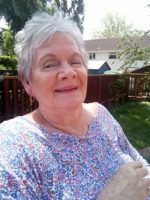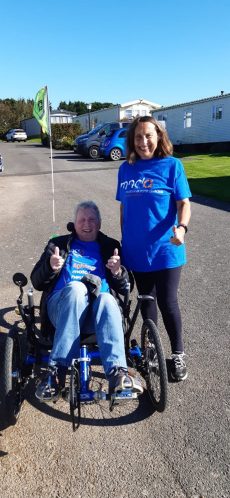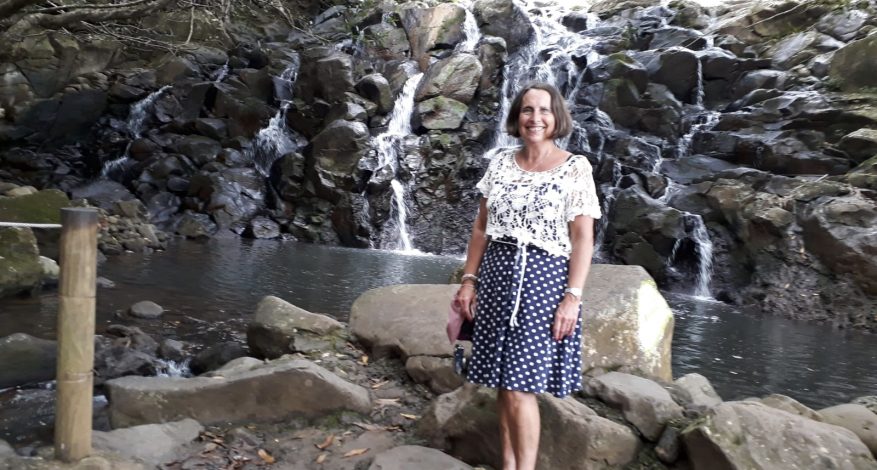An interview with Lynette Matravers on coping with lockdown as a carer for someone living with MND
“Brian’s not on the scrap heap. Just because he has Motor Neurone Disease, it doesn’t mean he can’t be helped”.
Interview by Scarlett Parr Reid, Medical Communicator.
As we reflect in our blog about Carer’s near and far living through lockdown, we would like to offer hope through an interview about resilience, assistance, discussing positive strategies to stay hopeful. Whilst we respect everyone’s experience will differ, we invite you to read our interview and share your own experiences through our website. Lynette Matravers is a paid Carer who kindly agreed to summarise their lockdown experiences, we look at how Covid 19 impacted daily life in lockdown for Carers and their wards, individuals impacted by #MND.
Carer, Lynette Matravers studied Anatomy and Physiology, followed by Aromatherapy, Reflexology and Sports Injury Management. Lynette worked at the Lympstone Commando Training Centre as a Civil Servant for 16.5 years. Lynette then took up work as a taxi driver, sadly this was impacted. As Lynette’s health declined, it transpired she a benign tumour on the lining of the brain was affecting daily life, Lynette could no longer work. After a successful operation to remove the tumour, Lynette began to recover. Brian Mackay recognised Lynette from the Commando Training Centre where he too had worked, he discovered that Lynette was offering voluntary massages for management of injury and health mobility.
 Sue needed more and more help on a daily basis. Sue and Lynette connec Brian requested Lyn massage his wife Sue (who suffers from dementia). ted like sisters. Brian needed help with Sue to keep her safe, making sure she was safety belted in the car, including help with personal hygiene. Later, Sue who was diagnosed at age 67, requiring increased care components she went into a home. Thereafter, Lynette continued to care for Brian, knowing she’d be able to help in his already constantly challenging life whilst diagnosed with Motor Neurone Disease (MND). Brian first experienced symptoms of MND at 62, gaining a confirmed diagnosis at age 65. Sue and Brian had been married for 50 years at this time, achieving 55 years of marriage next March, in 2021. Lynette attributes the ease of care to Brian’s cheerfulness, determination and positivity, which enables her to enable him to achieve his goals on a daily basis.
Sue needed more and more help on a daily basis. Sue and Lynette connec Brian requested Lyn massage his wife Sue (who suffers from dementia). ted like sisters. Brian needed help with Sue to keep her safe, making sure she was safety belted in the car, including help with personal hygiene. Later, Sue who was diagnosed at age 67, requiring increased care components she went into a home. Thereafter, Lynette continued to care for Brian, knowing she’d be able to help in his already constantly challenging life whilst diagnosed with Motor Neurone Disease (MND). Brian first experienced symptoms of MND at 62, gaining a confirmed diagnosis at age 65. Sue and Brian had been married for 50 years at this time, achieving 55 years of marriage next March, in 2021. Lynette attributes the ease of care to Brian’s cheerfulness, determination and positivity, which enables her to enable him to achieve his goals on a daily basis.
 Brian Mackay, Lynette’s ward, joined the Royal Marines in 1962, serving at the Lympstone Commando Training Centre where he was drafted to Aden followed by Plymouth, Norway, Singapore, Northern Ireland, Malta, Denmark and Bristol among other regions. Brian worked 22 years in the profession, winning medals along the way. Brian loves to travel and keep active, both of which have helped him to cope with his condition. This year, Brian, supported by Lyn and joined by Exmouth TriHards and family Triked to success in the MND Association’s #Mission 5000, cycling miles each day, with Lynette walking next to him, raising donations whilst filming updates, mapping routes and building awareness online for our Branch, the Association and #MND. Brian demonstrates grit, determination and a willingness to try new things, key to keeping positive whilst defying the limitations of MND. As Brian’s Carer, Lynette demonstrates the same levels of resilience, undertaking key roles in our Charity Challenges, walking equal miles beside him in support, whilst braving personal health challenges, demonstrating a robustness, through which caring components enable great feats.
Brian Mackay, Lynette’s ward, joined the Royal Marines in 1962, serving at the Lympstone Commando Training Centre where he was drafted to Aden followed by Plymouth, Norway, Singapore, Northern Ireland, Malta, Denmark and Bristol among other regions. Brian worked 22 years in the profession, winning medals along the way. Brian loves to travel and keep active, both of which have helped him to cope with his condition. This year, Brian, supported by Lyn and joined by Exmouth TriHards and family Triked to success in the MND Association’s #Mission 5000, cycling miles each day, with Lynette walking next to him, raising donations whilst filming updates, mapping routes and building awareness online for our Branch, the Association and #MND. Brian demonstrates grit, determination and a willingness to try new things, key to keeping positive whilst defying the limitations of MND. As Brian’s Carer, Lynette demonstrates the same levels of resilience, undertaking key roles in our Charity Challenges, walking equal miles beside him in support, whilst braving personal health challenges, demonstrating a robustness, through which caring components enable great feats.
Here is Lynette’s personal account as a Carer, before and during a pandemic:
“How did you feel going into the national lockdown the first time around? Were you supported and able to adapt to the changes?”
We were on a cruise when we first heard about the Coronavirus, and we weren’t able to return home as normal. We had to go through three international airports and the fear of it was quite something, especially with so many people trying to get home. I had never seen so many queues in an airport. Exmouth was quite dangerous, since they had over 35,000 families on their holidays. We had to completely change our routine.
Our way of socialising was going out and having coffee and cake, so we knew then we wouldn’t be able to do that. We had to isolate for two weeks when we got back, and I decided to get in some essentials. Then, we heard that the Town Crier had Coronavirus. The government hadn’t said to lock down, but at that point we just locked ourselves in to be safe. Lucky for us we had a dedicated lady shopping for us twice a week and she was absolutely brilliant. I did feel a bit like a trapped animal at first. So, I started doing some jigsaws and gardening, something that would please me. I thought if I could just do one job a day it would give me a focus. This Morning (ITV Network), provided company during lockdown, we felt less isolated, connected, discussions flowing freely with news updates.
At the time, we were grateful to have a wellbeing support worker who looked after Brian. We hadn’t heard from the doctor or the physiotherapist. I said to the doctor “Brian’s not on the scrap heap. Just because he has motor neurone disease, it doesn’t mean he can’t be helped”. Eventually after persisting, we got Brian a physio appointment. It wasn’t fair to rely on our Association Visitor (AV) at the MND Association as she was physically unwell at the time.
“Well, that’s the question isn’t it: who cares for the carers?”

Exactly! Anyway, Brian and I coped well as we get on very well. Brian loved cycling before he got MND, and his legs are still really strong. So, I said why don’t we get you a trike. He’s really taken to it and can manage it really well. It’s keeping him strong, clearing his chest and improving his lung health. I can then go for a walk with him knowing he’s actually enjoying it. In the wheelchair, he’s not getting the feel-good endorphins by oxygenating the blood.
The toning beds in Exmouth have no equipment to get people on and off the beds; I had to help Brian on and off the bed. I’m 65 and I shouldn’t be doing that. They need to adapt them, so they aren’t exclusively for the able-bodied. It would be fantastic if someone could design an exercise chair. It’s frustrating to see this kind of restriction, because I would even design an exercise chair. It’s frustrating to see this kind of restriction, because I would even design an accessible chair if I could.
“What did you learn from the experiences you had as a carer during the pandemic so far?”
To be okay with being at home.
“It’s something we take for granted isn’t it. We always expect to have a home, but if we are stuck in it for long periods, we feel negative.”
We found a lot more ways to enjoy being at home and spending time together.
“Do you have any coping strategies or ways that you have been able to look after your physical and mental health throughout this time?”
Cooking for Brian has been a lovely way to cope. We were getting nice food in and this helped us to cook better meals. And the gardening. It felt more homely. My friend said to me “you’re like a cat on hot coals. I can’t imagine you settling down at home”. I am always busy. Cooking is our norm for socialising.
“Has anything changed going into this lockdown in terms of how you have felt or your experiences managing?”
It is very different. Normally, we’d just drive out somewhere. Drivers seem to be more aggressive since the lockdown, maybe due to stress. So, we miss our drives. We also used to go to a climbing centre and there was the joy of seeing familiar faces. We miss that a lot.
“That sense of routine and connection with others is so important, would you agree?”
It really is.
“What have the Motor Neurone Disease Association charity and the NHS done to support you as a carer over this period?”
The NHS provided wellbeing services, but that was because I instigated it. They didn’t come to us. We were only seeing the NHS for bloods once a year before that, which I felt was wrong.
The Exeter and East Devon Branch kept in touch with us and was very supportive. They asked if Brian wanted to do the Mission 5000 on his trike and that was lovely. We managed to get down to the seafront and we would go for rides together. We felt very supported by the MND Association. If you can’t go through it, you go over it. If you can’t go over it, you go around it. It is not a war. We have choices. We are lucky we have still got a home to come back to.
“Are you feeling optimistic about the remainder of this period in lockdown?”
Yes – very optimistic. Even though it’s winter, we have things to look forward to. We have an overseas trip planned; hopefully, we will still be able to get away. I suffer from Seasonal Affective Disorder (S.A.D), so getting outdoors is really important. We like to face challenges head on. We will be joining the local sailing club, where Brian will be able to join Sailing for the Disabled. During this time, I will undergo hypnosis to overcome my fear of being out of my depth and learn to sail, as primary Carer, I need to be close by. Brian is a former Royal Marine, so I feed off his cheerfulness and endless drive to achieve. We make sure to have a laugh together.
“We’ve recently heard about the new brain implant, Stentrode, which will help those living with MND to operate a computer with their thoughts in order to speak and move. This has been successfully trialled on two male subjects with MND. How are you feeling about this?”
I was so excited when I saw it on the internet (for more information, click here) . I had never ever stopped having hope. With the implant, Sue could hopefully hear Brian’s voice, she has been unable to recognise the recorded voice which Brian has had to utilise to communicate due to the progression of MND. And why not?
We just want to know if it is going to be available for the average person and whether it is going to be available affordably via the NHS. If yes, and the opportunity exists, Brian would seize the opportunity, we are willing to trial too if the opportunity is available.
#mndcarers #carers #mnd #mndhelp #MNDfamily

Scarlett Parr-Reid: Science Communicator. Exeter University; Imperial College London.
As a Medical Sciences graduate and MSc Science Communication student, Scarlett is empowered by telling untold stories and illuminating the links between medical science and mental health. It is Scarlett’s mission to raise the voices of those who have made impactful contributions to the scientific field and others’ lives.

